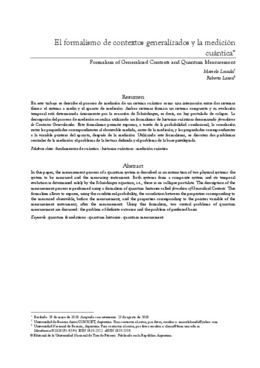El formalismo de contextos generalizados y la medición cuántica
Formalism of generalized contexts and quantum measurement

Ver/
Fecha
2019-04-01Autor
Losada, Marcelo; Laura, RobertoResumen
In this paper, the measurement process of a quantum system is described as an interaction of two physical systems: the system to be measured and the measuring instrument. Both systems form a composite system and its temporal evolution is determined solely by the Schrödinger equation, i.e., there is no collapse postulate. The description of the measurement process is performed using a formalism of quantum histories called formalism of Generalized Contexts. This formalism allows to express, using the conditional probability, the correlation between the properties corresponding to the measured observable, before the measurement, and the properties corresponding to the pointer variable of the measurement instrument, after the measurement. Using this formalism, two central problems of quantum measurement are discussed: the problem of definite outcome and the problem of preferred basis. En este trabajo se describe el proceso de medición de un sistema cuántico como una interacción entre dos sistemas físicos: el sistema a medir y el aparato de medición. Ambos sistemas forman un sistema compuesto y su evolución temporal está determinada únicamente por la ecuación de Schrödinger, es decir, no hay postulado de colapso. La descripción del proceso de medición se realiza utilizando un formalismo de historias cuánticas denominado formalismo de Contextos Generalizados. Este formalismo permite expresar, a través de la probabilidad condicional, la correlación entre las propiedades correspondientes al observable medido, antes de la medición, y las propiedades correspondientes a la variable puntero del aparato, después de la medición. Utilizando este formalismo, se discuten dos problemas centrales de la medición: el problema de la lectura definida y el problema de la base privilegiada.
